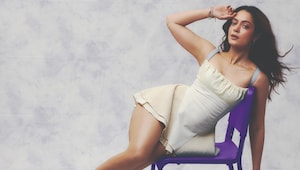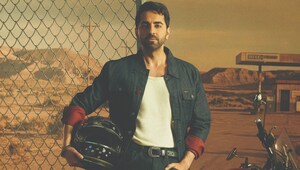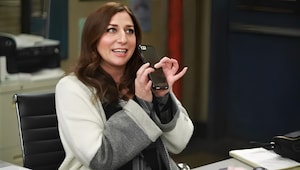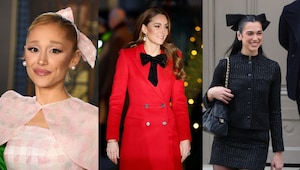"We Need to See More Women Not Just In Front of, But Behind the Camera": Huma Qureshi
Cosmo's July coverstar has some pressing issues to discuss...like the lack of female talent working behind the scenes in Bollywood.

Our July cover girl Huma Qureshi is living the dream. In 2012, she made her debut with the critically-acclaimed Gangs of Wasseypur and since then, she has broken stereotypes with author-backed roles in films like Dedh Ishqiya (2014), Badlapur (2015), and Viceroy’s House (2017). 2019 has been a fabulous year for her so far. She represented India at the coveted 72nd Cannes Film Festival, and her Netflix debut, Leila, is garnering praise from both Indian and international critics.
As we settle down to chat in-between shots (which are happening inside a life-size refrigerator with temperature colder than what Arctic seals can survive in— -10 degrees, BTW), Huma’s phone is on fire as congratulatory messages and calls are still pouring in. “I feel amazing and ecstatic,” she smiles. Based on Prayaag Akbar’s novel by the same name, the show is set in a dystopian world and follows the journey of Shalini (Huma’s character) who is searching for her missing daughter. After shows like Sacred Games and Ghoul, this is Netflix India’s third Original Series. It has been directed by Deepa Mehta who has previously directed socially-conscious (and controversial) films like Fire, Earth, and Water.
“A lot of people are saying that something like this has never been done in India, which is heartening to know. I feel humbled. Globally, digital platforms are churning out great content and I’m very happy to be a part of an Indian series that’s being considered to be at par with international films and shows,” Huma tells us.
It’s imperative to mention here that while Huma got into the skin of her character and made it believable, achieving that was no mean feat. It was a challenging role that demanded she unlearn the general rules of filmmaking and shed her inhibitions. “When I met Deepa, she told me two things: ‘One, don’t bring your bag of tricks as an actor. Be more real and more organic than anything you’ve ever done before. Two, no make-up and stylised hair’.” Huma agrees that was difficult. She was also skeptical because she was treading on uncharted waters. “I literally took 15 minutes to get ready. It was scary because there wasn’t any layer between me and the audience. But, in hindsight, I’m very grateful to Deepa for pushing me to make those choices and empowering me to give one of my best and most memorable performances.”
The no make-up rule was only a part of the challenge, though. Enacting her role was a different ballgame, too. For instance, in one scene, her character is forced to roll over leftover food strewn on a coarse floor. “I didn’t know how it would work out. But at some point in your career, you have to take certain chances. Sometimes they pay off, sometimes they don’t...but it’s a risk worth taking,” she explains.

And going by her career trajectory, Huma is clearly not one to shy away from risks! With some rather unconventional roles—a witch, a RAW agent, a sex worker—to her credit, she has balanced commercial and offbeat films with equal aplomb. “Growing up, I always looked up to actors who’d deliver performances that aren’t expected of them. Leila is something you don’t expect from me. And that took a lot of courage... In fact, all the courage I had. I also feel Netflix, as a platform, is more democratic, and lets you tell different stories and reach more people.”
While Huma has had the opportunity to essay a number of well-written characters, she’s also of the opinion that actresses still aren’t given fully fleshed-out roles in Bollywood. “More often than not, they are bystanders in other people’s stories, or are waiting to be rescued,” she opines. Globally, too, stars like Viola Davis, Cate Blanchett, and Octavia Spencer have spoken up about the issue. In fact, Frances McDormand, who won an Academy Award for the Best Actress in 2018, closed her winning speech with the words, “I have two words for you: inclusion rider”. For the uninitiated, an ‘inclusion rider’ is a clause than an actor can include in their contract, which requires that the cast and crew of a film meet a certain standard of diversity. “Times are a-changing but we still have a long way to go. We need to see more women not just in front of, but also behind the camera. We need female writers, producers, directors, producers, camerapersons, technicians, editors... It’s very important to represent the other half of the population. I feel like we should be telling stories of women, all sorts of women—good, bad, strong, weak. It is important to have diversity in storytelling. That should be the future,” Huma says.
As the conversation steers towards the future of cinema, Huma tells us that she’s currently gearing up for Zack Snyder’s [of Justice League, Man of Steel, 300 fame] Army of the Dead in LA. Her eyes light up and she seems visibly excited as she talks about the upcoming project. We prod her for deets. “I can’t tell you much about the film or my character, but I’m very excited and I can’t wait to start filming,” she grins. As we coax her, she gives in and lets slip that it’s in sync with the tradition of Zack’s mega-zombie movies, and she has her role cut out for her. However, she isn’t taking any special training. “I’m a very instinctive actor, I switch on and switch off. I’m not a method actor, I hate the word ‘method acting’. It’s an overused and abused terminology. I collaborate with people on an intuitive level, which is why I consider myself a director’s actor. Having said that, every role demands a certain kind of prep, and I do prep a lot. But once I’m on the set, I just go with the flow.”
With Army of the Dead, Huma would be embarking on her Hollywood journey. In the past, her contemporaries like Priyanka Chopra and Deepika Padukone have starred in Hollywood films while working on the home turf, too. Would it be the same for Huma or would she pick a side? “My side is every side. My side is good storytelling. I don’t mind doing a Tamil film, or an English film or a Hindi one, you know? As an artist, I just want to be a part of good stories and work with great collaborators, directors, and writers. That’s what really stimulates me.”
more from Celebrity

Anya Singh is just getting started

Ayushmann Khurrana reflects on navigating Bollywood, being embraced as an outsider, and the layered realities of fame

Taylor Swift's exact workout that kept her stage ready for the Eras Tour

Forget New Year's resolutions, this is Team Cosmo’s official f**k it list

Bows are back and they’re not playing cute anymore

If you’re celebrating this season, you’ll want to do it at Shangri-La Eros New Delhi

Eight slightly unhinged New Year rituals that the internet swears will fix your life

Your guide to all the cute accessories for elevating every party look!

What does it mean to be queer after 'Heated Rivalry' ended?

9 surprising foods to avoid if you want better sleep: from tomatoes to soy sauce
